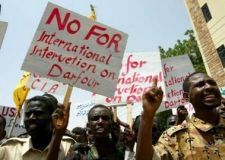Sudan says sanctions will not resovle Darfur crisis
Dec 14, 2006 (KHARTOUM) — Sudan on Thursday brushed off the Western threat to impose sanctions and no-fly zones for its refusal to allow U.N. peacekeepers in Darfur, saying such penalties would not solve the problem.
 But a Sudanese legislator said the government had asked his party to broker a compromise with the United Nations under it would allow the world body to deploy peacekeepers if it granted immunity of prosecution to Sudanese officials accused of war crimes and crimes against humanity.
But a Sudanese legislator said the government had asked his party to broker a compromise with the United Nations under it would allow the world body to deploy peacekeepers if it granted immunity of prosecution to Sudanese officials accused of war crimes and crimes against humanity.
More than 200,000 people have been killed and 2.5 million people displaced in nearly four years of fighting in Darfur. The government opposes a U.N. Security Council plan to replace an overwhelmed African Union peacekeeping mission of 7,000 troops with 20,000 U.N. peacekeepers.
The government has often been accused, as recently as Monday, of violating U.N. Security Council resolutions by using warplanes to bomb targets in Darfur and killing civilians.
British Prime Minister Tony Blair said this week he would favor enforcing a “no-fly zone” over Darfur, similar to those imposed on north and south Iraq during the regime of Saddam Hussein.
It is not clear how no-fly zones could be maintained over Darfur, a large region in the center of the African continent, far from U.S. bases and aircraft carriers.
This week the U.S. State Department raised the possibility of tougher sanctions to pressure Khartoum into accepting U.N. intervention. And the International Criminal Court said it would begin filing indictments against suspected Darfur war criminals in February.
Last year U.N. investigators named 51 people, including senior government officials, as being responsible for atrocities in the western Sudanese region.
“Threats of sanctions and military action, or the imposition of a no-flight zone will not help resolve the problem” in Darfur, Sudanese foreign ministry spokesman Ali al-Sadiq said Thursday. “This problem (Darfur) is a political one, and it should be remedied through political channels.”
An adviser to the Sudanese president, Maghzoub Faidul, said he hoped the U.S. and British governments had “learnt their lessons from the past,” an apparent reference to their invasion of Iraq.
“Force alone and unilateral sanctions and threats have never resolved any problem in any area of the world,” Faidul said.
Possible sanctions on Sudan include restrictions on its booming oil industry and a naval blockade of its only major port _ Port Sudan on the Red Sea. However, China, which has veto rights in the U.N. Security Council, might well reject such measures as it is the major foreign investor in the Sudanese oil fields.
Sudanese President Omar al-Bashir accuses the West of exaggerating the Darfur crisis, claiming the number of casualties is 20 times lower than U.N. estimates. He rejects U.N. peacekeepers as a neo-colonial force, and says Sudanese citizens cannot be prosecuted by the ICC because his government, like Washington, has not ratified the convention behind the tribunal.
A senior southern legislator, a member of the Sudan People’s Liberation Movement that fought the government until last year’s peace treaty, has said Khartoum opposes U.N. peacekeepers because it fears their deployment will make it easier to prosecute those indicted by the ICC.
The legislator, who spoke on condition of anonymity because of the sensitivity of the issue, said the government had asked the SPLM to broker a deal by which U.N. peacekeepers would be allowed in Darfur in exchange for immunity of prosecution for Sudanese suspected of war crimes.
“If the international community guarantees immunity, the crisis will be over in Darfur,” he said.
Government officials could not reached for comment on the legislator’s remarks Thursday.
(AP)
